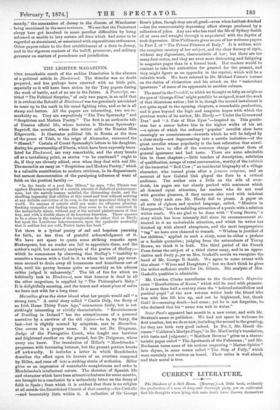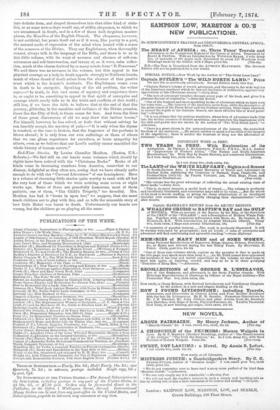CURRENT LITERATURE.
The Shadows of a Sick Room. (Murray.)—A little book, evidently the production of a man of deep and thorough piety, yet so cultivated that his thoughts when lying sick unto death have thrown themselves into definite form, and shaped themselves into that older kind of state- lier, or as some now-a-days would say, of stiffer, eloquence, to which we are accustomed in South, and in a few of those half-forgotten master- pieces, the Homilies of the English Church. The eloquence, however, is not artificial, but pours itself out as if it were, like poetry to a poet, the natural mode of expression of the mind when heated with a sense of the nearness of the Divine. They say Englishmen, when thoroughly roused, always talk in the language of the Bible, and there is to us in this little volume, with its want of newness and absence of self-con- sciousness and self-introversion, and luxury of, as it were, calm reflec- tion, much of the charm derived by so many minds from "11 Penseroso." We said there was no newness in the volume, but this appeal to the physical courage as a help in death appeals strongly to Northern hearts, much of whose dread of death arises from the absence of that passive trust which is the Asiatic's fortitude. The Englishman wants even in death to be energetic. Speaking of the old problem, the writer says :—" In truth, in this vast ocean of mystery and conjecture there is, or ought to be, something to appeal to that spirit of enterprise and courage which rarely fails us in the trials and conflicts of this world ; still less, if we have the faith to believe that' at the end of that dim journey, glittering in the sunshine and radiance of the Divine promise, there lies the City of God, is there cause for fear. And from the lives of those great discoverers of old we may draw this farther lesson." For himself, however, he has solved, or feels that without solving he can heartily accept, the mystery of pain :—" It is only when the thyme is crushed, or the vase is broken, that the fragrance of the perfume is blown abroad ; it is only from our own sufferings or those of others that we can glean experience for ourselves, or learn sympathy for others, even as we believe that our Lord's earthly career sanctified the whole history of human sorrow."
Bed-Time Stories. By Louise Chandler Moulton. (Boston, U.S.: Roberts.)—We find still on our hands some volumes which should by rights have been noticed with the "Christmas Books." Books of all kinds come in increasing numbers from America, somewhat to our dismay, delightful as they often are, seeing that we have already quite enough to do with the "Current Literature" of one hemisphere. Here is a volume of charming little stories quite worthy to rank with all but the very best of those which we were noticing some seven or eight weeks ago. Some of them are gracefully humorous, most of them pathetic, one of them, "The Child's Tragedy," too dreadful. Mrs. Moulton has had it "borne in upon her," we suppose, that she must teach children not to play with fire, and so tells the miserable story of how little Mabel was burnt to death. Unfortunately our hearts are wrung, but the children go on playing all the same.



































 Previous page
Previous page